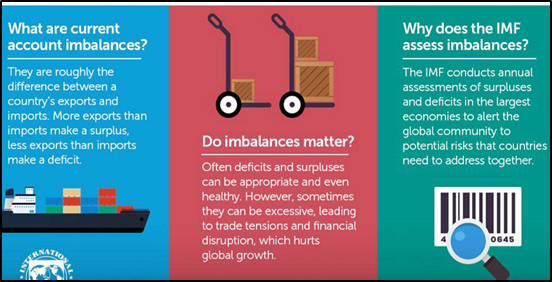In News:
- Recently published External Sector Report 2022 by IMF has said that the RBI’s intervention in the currency market should be limited to addressing disorderly market conditions.
- Produced annually since 2012, External Sector Report analyses global external developments and provides multilaterally consistent assessments of external positions of the world’s largest economies.
What’s in today’s article:
- About IMF
- Highlights of the External Sector Report 2022
International Monetary Fund (IMF):
- The IMF is an international financial institution (headquartered in Washington D.C., US).
- It works to achieve sustainable growth and prosperity for all of its 190 member countries. It is governed by and accountable to its member countries.
- Formed in 1944 at the Bretton Woods Conference, IMF came into formal existence in 1945 with the goal of reconstructing the international monetary system.
- The IMF has three critical missions:
- Furthering international monetary cooperation,
- Encouraging the expansion of trade and economic growth,
- Discouraging policies that would harm prosperity.
- To fulfill these missions,
- The IMF member countries work collaboratively with each other and with other international bodies.
- The IMF supports economic policies that promote financial stability and monetary cooperation, which are essential to increase productivity, job creation and economic well-being.
- It now plays a central role in the management of balance of payments difficulties (experienced by a member country) and international financial crises.
- Member countries contribute funds to a pool through a quota system from which countries experiencing balance of payments problems can borrow money.
Some important reports published by IMF:
- World Economic Outlook
- Global Financial Stability Report
- Fiscal Monitor
The External Sector Report 2022:
Key highlights:
- The pandemic has continued to have an uneven impact on economies' current account balances, owing to a shift in consumption from services to goods.

- Commodity prices recovered from the COVID-19 shock and began rising in 2021.
- The medium-term outlook for global current account balances is gradually improving as the pandemic's impact fades, commodity prices normalise and fiscal consolidation in current account deficit economies continues.
India specific observations:
- The report comes at a time when the Indian rupee and several other emerging market currencies are under pressure.
- The RBI has reduced its forex reserves to prevent a sharp depreciation in the face of repeated rate hikes in developed countries (particularly the United States) and the uncertainty caused by geopolitical tensions.
- As per the report,
- The RBI’s intervention in the currency market should be limited to addressing disorderly market conditions and exchange rate flexibility should act as the main shock absorber.
- India's official forex reserves are sufficient for precautionary purposes, implying that additional reserves are less warranted.
- According to the IMF, rising commodity prices and the Ukraine conflict will increase India's current account deficit (CAD) to 3.1% of GDP in 2022, up from 1.2% last year.
- The IMF also stated that the CAD is broadly consistent with India's per capita income, positive growth prospects, demographic trends and development needs.
- In comparison to peers, India's low level of foreign liabilities reflects an incremental approach to capital account liberalisation that has primarily focused on attracting Foreign Direct Investment (FDI).
- Policy prescriptions:
- The report proposed a gradual withdrawal of fiscal and monetary policy stimulus, which has already begun and is boosting exports.
- It suggested that the government should negotiate free trade agreements with major trading partners in order to increase exports, liberalise the investment regime and reduce import duties.
- Structural reforms could increase integration in global value chains and attract FDI, reducing external vulnerabilities.










